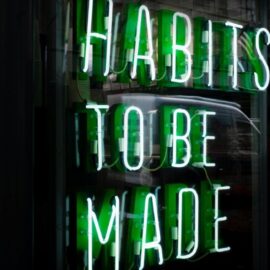

This article is an excerpt from the Shortform book guide to "The Willpower Instinct" by Kelly McGonigal. Shortform has the world's best summaries and analyses of books you should be reading.
Like this article? Sign up for a free trial here .
Why do we assume we’ll be more inclined to do something tomorrow that we didn’t want to do today? Why do we see our future selves as different people?
Research shows that you see your future self as a completely different person. This makes you procrastinate on your goals because you assume that future-you will pick up the slack.
Here are some tips on how to stop seeing your future self as another person.
Future You Is Still You
We tend to think of our future selves as different people than we are today—like strangers or sometimes even like superheroes. Most of us see our future selves in a much better light than we see our present selves. We believe our future self will not struggle with procrastination the way our present self does, or our future self will not want to eat that cupcake like our present self does.
Why do we deceive ourselves this way? Because your future self’s feelings and emotions aren’t as real and present as what you’re feeling right now. For example, when we commit to doing 20 hours of volunteer work next month instead of this month, we don’t realize we’ll probably be just as busy next month as we are right now. Thirty days from now, it’s going to be just as tough to squeeze in those 20 volunteer hours as it is right now.
The research: Brain-imaging studies show that when we imagine our future selves, we actually utilize a different region of the brain than we use to think about our present selves. The future-self region is the same region we use to think about other people. In other words, we see our future self as someone completely outside of who we are right now. It’s no wonder we place more emphasis on pleasing ourselves right now.
How much we see our future selves as separate from our present selves varies from person to person. For some, the future self is basically a stranger—and why would anyone invest their energies in a stranger? If you’re disconnected in this way from your future self, you will be more interested in immediate gratification and satisfying fleeting impulses.
For others, the present and future self are more closely paired. These people tend to have a stronger future orientation. They save more for retirement, take better care of their health, and invest in long-lasting relationships.
Tip #1: Say Hello to Your Future Self
Not surprisingly, strengthening your relationship with your future self can help shore up your willpower. If you make a close connection between who you are now and who you will be later, you’ll be more willing to shun short-term impulses and work toward being the best version of yourself.
Here are two ways to make the future feel less abstract:
- Snap a Mental Selfie of Your Future Self: It’s 4 p.m. and you’re choosing between going for a run and lying on the chaise lounge with a cocktail. Picture yourself a week from now doing your normal activities—going to work or the grocery store or taking your kids to school. Connect your present self to that future self. How will your future self feel about the choices you’re making right now? Will she feel empowered? Will she feel thankful that you made such good choices, or sad that you didn’t? Can you imagine her reaping the benefits of the actions you take today?
- Email Your Future Self: If you want to take it a step further, an organization called FutureMe.org lets you send an email to your future self. You can write down your dreams and hopes for your future self, and the website will send you that email on a future date of your choice.
Tip #2: Pre-Commit to Your Future Goals
Another method that can help you slam the door on instant gratification is to pre-commit. For example, if you pack a healthy lunch to take to work, you’ll be more likely to forego the greasy food truck. Or if you prepay for your twice-yearly dental checkups, you’ll be more likely to go.
When Delayed Gratification Gets Extreme
Some people have the opposite of a willpower problem. Instead of choosing instant gratification, they consistently put off pleasure. People who have this condition, known as hyperopia, never feel like it’s time to celebrate or indulge. They choose work over almost any other activity, and they focus so much on the future that they miss out on a lot of present-tense good stuff.

———End of Preview———
Like what you just read? Read the rest of the world's best book summary and analysis of Kelly McGonigal's "The Willpower Instinct" at Shortform .
Here's what you'll find in our full The Willpower Instinct summary :
- That willpower isn't a character trait but rather an innate instinct that's wired into our brains
- How marketers can use "neuromarketing" to influence you to purchase more
- How you can harness your innate willpower to achieve your goals






